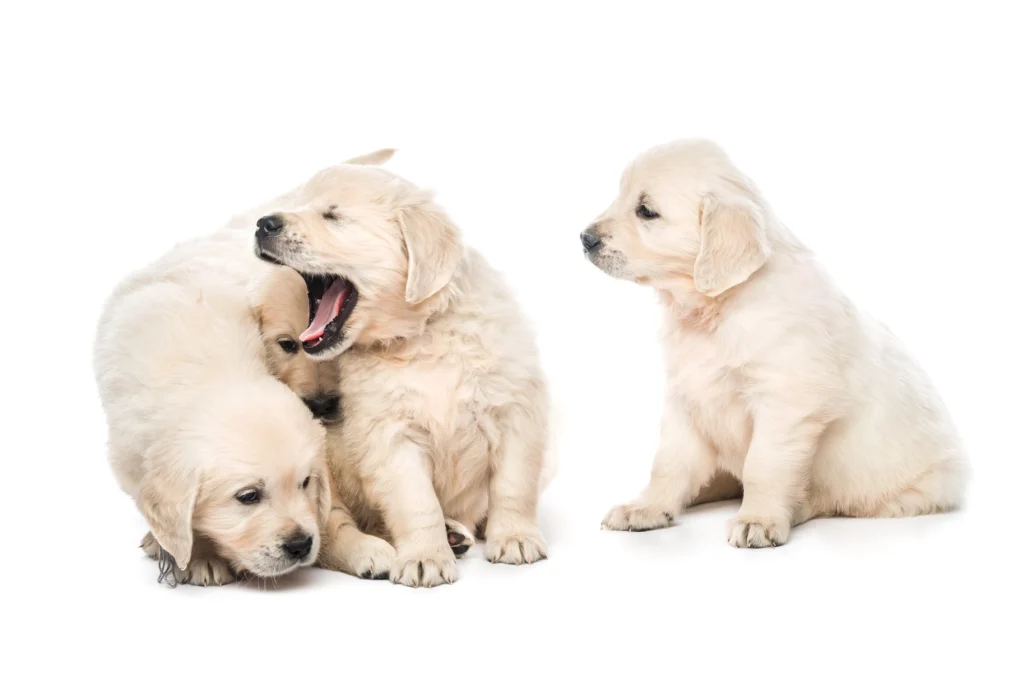Teaching a furry friend appropriate toilet manners may seem like a daunting endeavor when you first bring them into your house. However, this critical phase provides a life-changing encounter that deepens the owner-dog relationship.
This guide demonstrates the process of educating a puppy successfully through a combination of canine psychology knowledge with consistency and patience. While at it, it is essential to brace yourself for a worthwhile journey full of turning points, accidents, and peaceful cohabitation with your family’s best friend.
Start Early
Training a puppy early on potty training helps to develop lifelong positive habits and a happy relationship with the owner. It helps to speed up learning, encourage good restroom behavior, and reduce the risk of accidents.

Golden Retriever Puppies
Early nature call training creates a foundation for a well-mannered furry companion, lessening stress and facilitating a seamless absorption into the family. It is important to start the training process when they are about 8 weeks of age while exercising patience and consistency.
Create a Routine
It is important to establish a pattern while toilet training a puppy for a number of reasons. First, it fosters consistency, which is essential for effective learning, and helps your puppy comprehend expectations. A good regimen teaches bladder control and lowers the number of accidents that can happen. It builds your puppy’s confidence and a sense of security as they learn to anticipate toilet breaks. They get to trust their surroundings and caretakers, creating a good foundation in their discipline.
Choose a Specific Spot
During potty training, it is critical to set a designated ground for your puppy to make their nature calls to maintain consistency and encourage positive behavior. By selecting a certain area, you assist your dog create a habit allowing them to recognize where they should take their call. You can obtain toilet training results more rapidly and efficiently with this targeted strategy, which helps to minimize confusion and reinforce the desired habit.
Reinforce Behavior
Potty training requires reinforcement, which is critical to the development of your puppy and peace within the family. Consistency helps them understand the need for desirable behavior and enhances the connection between good results and eliminating outside behavior. It builds up the desired habit, increasing the likelihood that your dog will perform the learned behavior. It also builds a trustworthy relationship with the owner, laying the groundwork for successful learning and communication during their lifetime.
Supervise
It is essential to supervise or confine your puppy during the initial phases of nature call training. This helps create a constant routine that limits mishaps and encourages good habits. Prompt correction and praise are possible if you exercise tight supervision, which speeds up learning and association. Finally, confinement ensures a more seamless and effective transition to potty training freedom by preventing your puppy from developing undesirable habits or being confused about where to relieve themselves.
Recognize Signs
When toilet training a puppy, it is critical to identify the subtle cues of nature’s calls to promote good communication and avoid accidents. Through close observation of actions such as circling, sniffing, or restlessness, pet owners may quickly direct their animals to their designated areas, promoting good habits. In addition to quickening the learning process, this attentiveness fortifies the relationship between the owner and puppy and builds a strong basis for mutual understanding and collaboration throughout life.
Exercise Patience
Like human newborns, puppies need time to learn new ideas and actions. However, they can only get understanding and kind direction through their growth stage when you exercise patience. Rushing the process might result in misunderstandings or disappointments as the puppy will never feel calm with their surroundings. However, taking time while teaching them will help accomplish your training objectives as it fosters a relationship of confidence and trust between you and your pet.
Consult a Professional
A trainer can offer customized advice based on your puppy’s unique requirements and characteristics, guaranteeing successful and efficient training techniques. They can also assist in identifying underlying problems like anxiety or illnesses that could impede development. Expert guidance also promotes patience and consistency, which are essential for both long-term bonding with your dog and effective potty training.
Potty training your dog is a journey that calls for tolerance, understanding, and consistency. Remember that obstacles are a necessary part of this process, but persistence develops a solid relationship with your pet. Providing calm direction and an encouraging tone not only teaches them where to go but also fosters a connection that will last a lifetime based on communication and trust.
